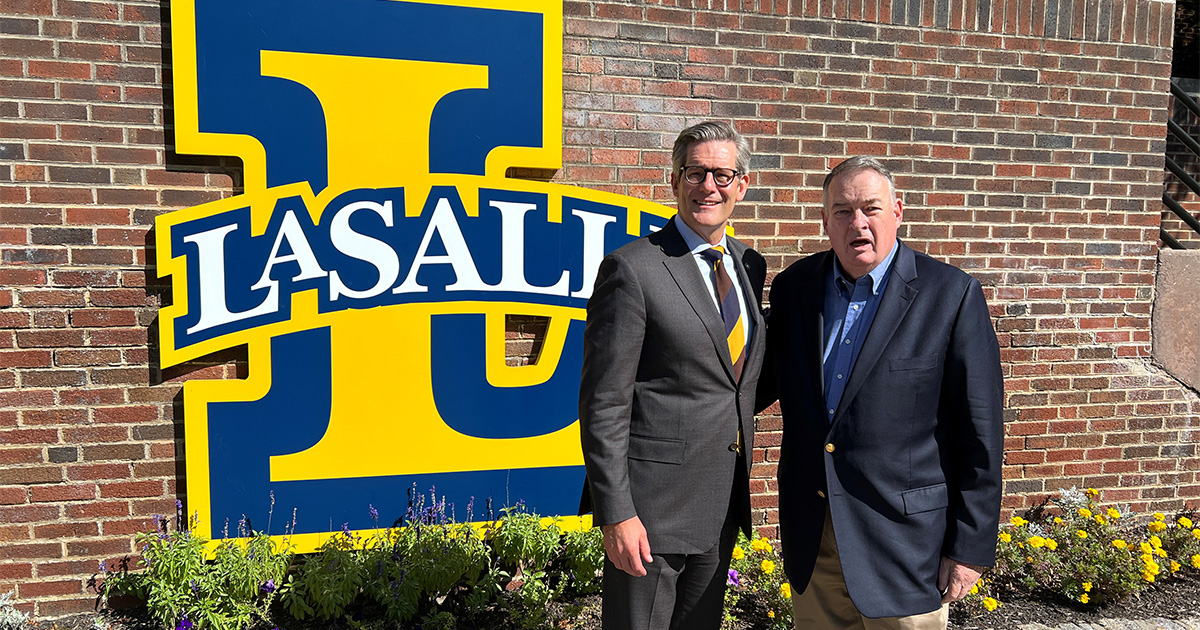La Salle University
Students get an insider’s look at the intelligence community from alumnus and career professional
William M. Nolte, ’70, Ph.D., was the guest speaker in the Introduction to International Relations class.

President Daniel J. Allen, Ph.D., thanked William M. Nolte, ’70, Ph.D., after speaking with students in the Introduction to International Relations class about Nolte’s long career as an intelligence officer on Oct. 3, 2023.
Students in Assistant Professor Mark A. Thomas’, ’86, Ph.D., Introduction to International Relations class got a firsthand look at the history and inner workings of the intelligence community when William M. Nolte, ’70, Ph.D. visited on Oct. 3, 2023.”Most of my colleagues from the intelligence community would, if you ask them to define intelligence, would drift around on the fringes. But there’s one word that they throw in there—secret, that they were gathering ‘secret’ information.
“And one of the things I’ve been struggling with my colleagues and their former colleagues for a long time, is that since the 20th century, 21st century, intelligence is going to be about information, of which secrets will be a part. But it’s not the whole thing.”
Nolte retired from full-time work in 2006 after 30 years of active service as a career intelligence officer with stops at the National Security Agency (NSA), Central Intelligence Agency (CIA), and the Office of the Director of National Intelligence (DNI). He continued working as a consultant until 2021.
Looking back on his career he noted that “beyond some stressful and even sad moments, I had a wonderful time—working with smart and dedicated colleagues, reading about and writing about interesting events, and the opportunity to travel to nearly two dozen countries. And to get paid for it!”
During his talk, he traced the development of intelligence gathering from human intelligence to code breaking to the satellite era.
“What’s the most significant American intelligence effort between the Revolutionary War and the Civil War?,” Nolte asked the class. “It was the Lewis and Clark expedition. Lewis and Clark went on a ‘voyage of discovery,’ as President Thomas Jefferson called it. Well, that’s a cover term in the intel business…They were supposed to chart things like where rivers could be forded…and one of the things Lewis and Clark were supposed to do was find ways to map the Louisiana Territory for military purposes.”

Nolte, who is currently a lecturer at The Catholic University of America, was a former director of education and training in the office of the Director of National Intelligence and chancellor of the National Intelligence University. He has taught at several Washington-area universities, and in addition to his history degree from La Salle University, he earned a Ph.D. from the University of Maryland.
Most people don’t realize that there are 17 agencies in the U.S. with intelligence gathering capabilities, Nolte said. While the CIA, NSA, National Geospatial-Intelligence Agency, Federal Bureau of Investigation etc. are widely regarded to be included within that list, Nolte lamented that others such as the Centers for Disease Control and Prevention, National Institutes of Health, and the United States Public Health Service also should be considered.
“I would argue that during COVID, these were some of the most important intelligence agencies,” he said.
One of the biggest shifts taking place in the intelligence community is the renewed use of open-source materials.
“Ninety-five percent of the information in the world comes from open source,” Nolte said. “Back in the Second World War, when we didn’t have satellites, and we didn’t have a huge SIGINT (signals intelligence) operation, the OSS (Office of Strategic Services, the precursor to the CIA) worked very hard on getting newspapers out of occupied Europe, maps out of occupied Europe. These were open-source materials, and they were vital.”
The reliance on open-source materials—which he calls–real-world information, has taken on a new life in recent years after becoming less of a focus during the Cold War.
“We grew up in the Cold War thinking open source was not that valuable” because the public information coming out of the former Soviet Union was less reliable from that closed society.
Nolte credits his education at La Salle for establishing a solid foundation for his career.
“I had a couple of wonderful history professors at La Salle,” he recalled. “I got a very good liberal arts education here. I was well grounded. When I got into graduate school, there was nothing I didn’t think I could handle.”
—Brian Kirschner